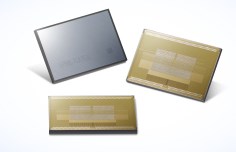
Posted on Tuesday, July 18 2017 @ 13:45 CEST by Thomas De Maesschalck
Samsung send out a press release to reveal it's increasing its production HBM2 chips with a capacity of 8GB.
As usual, these announcements are light on details but Samsung did share that it expects 8GB HBM2 will represent over 50 percent of its HBM2 production by the first half of 2018. These chips aren't only for consumer video cards but also for AI, HPC, networking and enterprise server applications.
Samsung Electronics Co., Ltd., the world leader in advanced memory technology, today announced that it is increasing the production volume of its 8-gigabyte (GB) High Bandwidth Memory-2 (HBM2) to meet growing market needs across a wide range of applications including artificial intelligence, HPC (high-performance computing), advanced graphics, network systems and enterprise servers.
“By increasing production of the industry’s only 8GB HBM2 solution now available, we are aiming to ensure that global IT system manufacturers have sufficient supply for timely development of new and upgraded systems,” said Jaesoo Han, executive vice president, Memory Sales & Marketing team at Samsung Electronics. “We will continue to deliver more advanced HBM2 line-ups, while closely cooperating with our global IT customers.”
Samsung’s 8GB HBM2 delivers the highest level of HBM2 performance, reliability and energy efficiency in the industry, underscoring the company’s commitment to DRAM innovation. Among the HBM2 and TSV (Through Silicon Via) technologies that were utilized for the latest DRAM solution, more than 850 of them have been submitted for patents or already patented.
The 8GB HBM2 consists of eight 8-gigabit (Gb) HBM2 dies and a buffer die at the bottom of the stack, which are all vertically interconnected by TSVs and microbumps. With each die containing over 5,000 TSVs, a single Samsung 8GB HBM2 package has over 40,000 TSVs. The utilization of so many TSVs, including spares, ensures high performance, by enabling data paths to be switched to different TSVs when a delay in data transmission occurs. The HBM2 is also designed to prevent overheating beyond certain temperature to guarantee high reliability.
First introduced in June 2016, the HBM2 boasts a 256GB/s data transmission bandwidth, offering more than an eight-fold increase over a 32GB/s GDDR5 DRAM chip. With capacity double that of 4GB HBM2, the 8GB solution contributes greatly to improving system performance and energy efficiency, offering ideal upgrades to data-intensive, high-end computing applications that deal with machine learning, parallel computing and graphics rendering.
In meeting increasing market demand, Samsung anticipates that its volume production of the 8GB HBM2 will cover more than 50 percent of its HBM2 production by the first half of next year.
